[Editor’s Note: EDRM is proud to publish Ralph Losey’s advocacy and analysis. The opinions and positions are Ralph Losey’s copyrighted work.]
While almost everyone is panicking about a potential robot apocalypse, Dario Amodei, the CEO and co-founder of Anthropic (“Claude”), is explaining how AI might compress 100 years of medical progress into a decade, cure mental illnesses such as PTSD and depression, and alleviate poverty. Dario, a well-respected scientist previously known for his cautious, even gloomy, outlook, now speaks with optimism—and the world is listening.
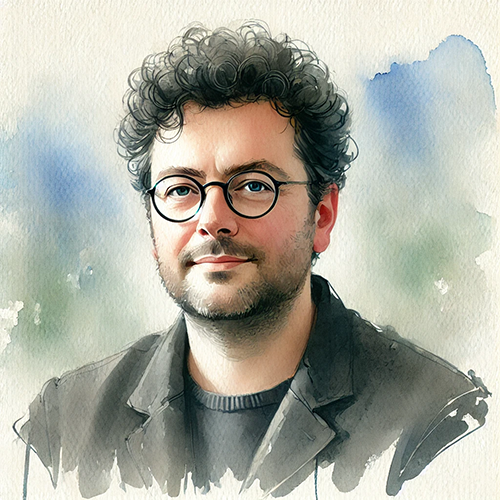
Watercolor style image by Ralph Losey using his Visual Muse GPT.
Amodei is not a salesman like Sam Altman, who frequently makes similar predictions. Instead, Dario Amodei is an experienced scientist known for highlighting the risks of AI. He holds a Ph.D. in biophysics from Princeton and completed his postdoctoral research at Stanford School of Medicine. He also served as the Vice President of Research at OpenAI. In 2021, he and his sister, Daniela Amodei, the former Vice President for Safety and Policy at OpenAI, left the company to co-found Anthropic. Amodei’s detailed predictions in his 28-page essay, Machines of Loving Grace, are both profound and inspiring.
Dario’s essay is filled with science, rigorous analysis, and joyful visions, many of which he believes could begin to materialize as early as 2026. This optimistic outlook offers us all a much-needed breath of fresh air.



Images by Ralph Losey using WordPress’s Stable Diffusion.
Introduction
Unlike Sam Altman, Dario Amodei’s future predictions go into specifics grounded in science and analysis. His 14,000-word essay, Machines of Loving Grace (October 2024), makes predictions in the five categories that Amodei is most excited about. It is not meant to be all-inclusive. Amodei focuses on five main categories in his predictions:
- Biology and physical health
- Neuroscience and mental health
- Economic development and poverty
- Peace and governance
- Work and meaning
Since Dario Amodei is a respected scientist and business leader, his visions of the future are taken very seriously, even if they do sound like science fiction. Dario reluctantly admits he is a science fiction fan and mentions one book, The Player of Games. (I reread it and noticed two spaceship names I recognized: Of Course I Still Love You and Just Read the Instructions. Sound familiar?)
Amodei starts his essay with an important point, that we do ourselves a disfavor by just dwelling on the negatives and not keeping our eye on “how radical the upside of AI could be.” In his new essay Amodei, who was previously known as a doom and gloomer, tries to sketch out what a world with powerful AI might look like, if everything goes right. Sam Altman has been good at this for years, but he lacks the gravitas, ethical reputation, and scientific knowledge that Amodei has. Can AI Really Save the Future? A Lawyer’s Take on Sam Altman’s Optimistic Vision (10/4/24).

The positive visions of Dario, including what he calls a century of progress in a decade, are what motivate people to do the hard work to improve AI. That, and money, fame, and power, of course. But I reject the cynics who say that’s all it is – just a sales pitch to raise more money. As Amodei puts it at the start of his essay:
I think it is critical to have a genuinely inspiring vision of the future, and not just a plan to fight fires. Many of the implications of powerful AI are adversarial or dangerous, but at the end of it all, there has to be something we’re fighting for, some positive-sum outcome where everyone is better off, something to rally people to rise above their squabbles and confront the challenges ahead. Fear is one kind of motivator, but it’s not enough: we need hope as well.
Dario Amodei, Machines of Loving Grace (October 2024).
Progress is never made by cynical focus on everything that can go wrong. If we just focus on the negatives, we will never be able to unlock the positive potential. We need to envision the amazing things that could happen and figure out how we can help make that future a reality. This means approaching AI with a balanced perspective, recognizing both the potential downsides and benefits, then working proactively to mitigate the risks while pursuing the benefits.
The future is not predetermined. It’s up to us to create it. And with AI, we have a tool that can either amplify our worst tendencies or help us achieve our greatest aspirations. It’s our choice which path we take.

Image by Ralph Losey using WordPress’s Stable Diffusion.
Amodei’s Basic Framework and Assumptions
Amodei uses the term “Powerful AI” in his essay, preferring it over the commonly used Artificial General Intelligence (“AGI”). It is, in fact, quite similar to the AGI concept I’ve referenced in previous articles. Amodei predicts that Powerful AI could emerge as early as 2026, though it may take longer depending on various factors. He defines Powerful AI with six distinct characteristics (all quoted from his essay):
- In terms of pure intelligence4, it is smarter than a Nobel Prize winner across most relevant fields – biology, programming, math, engineering, writing, etc.
- It has all the “interfaces” available to a human working virtually, including text, audio, video, mouse and keyboard control, and internet access. It can engage in any actions, communications, or remote operations enabled by this interface, including taking actions on the internet, taking or giving directions to humans, ordering materials, directing experiments, watching videos, making videos, and so on. It does all of these tasks with, again, a skill exceeding that of the most capable humans in the world.
- It does not just passively answer questions; instead, it can be given tasks that take hours, days, or weeks to complete, and then goes off and does those tasks autonomously, in the way a smart employee would, asking for clarification as necessary.
- It does not have a physical embodiment (other than living on a computer screen), but it can control existing physical tools, robots, or laboratory equipment through a computer; in theory it could even design robots or equipment for itself to use.
- The resources used to train the model can be repurposed to run millions of instances of it. . . . and the model can absorb information and generate actions at roughly 10x-100x human speed5 . . .
- Each of these million copies can act independently on unrelated tasks, or if needed can all work together in the same way humans would collaborate . . .
Amodei closes this impressive list of characteristics necessary for today’s AI to become Powerful AI, a/k/a an AGI, with this catchy phrase: We could summarize this as a “country of geniuses in a datacenter.” This sounds somewhat like the Genie in a Bottle myth from Islamic cultures.
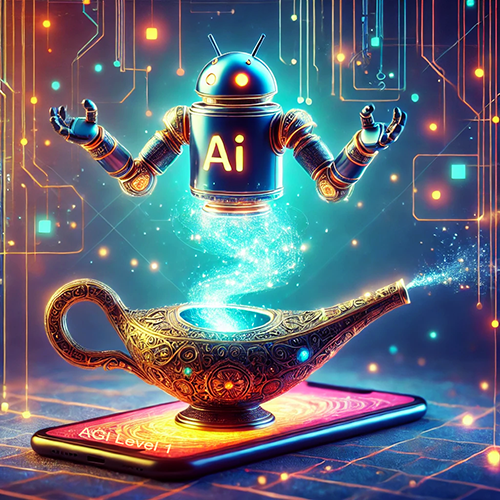
1. Biology and Physical Health
This is the area about which Dario Amodei, an AI biophysicist, is best equipped to make predictions. Amodei states: Biology is probably the area where scientific progress has the greatest potential to directly and unambiguously improve the quality of human life. This assertion seems well-supported.
Now for the wonders he thinks could come to pass once AI reaches Powerful AI level, which remember he says could come as early as 2026. He presents detailed and compelling arguments for the feasibility of these predictions and explains how AI will facilitate such breakthroughs. For a full exploration of these ideas, you should read his original essay, Machines of Loving Grace. His overall prediction regarding the rate of improvement that Powerful AI will bring is as follows:
To summarize the above, my basic prediction is that AI-enabled biology and medicine will allow us to compress the progress that human biologists would have achieved over the next 50-100 years into 5-10 years. I’ll refer to this as the “compressed 21st century”: the idea that after powerful AI is developed, we will in a few years make all the progress in biology and medicine that we would have made in the whole 21st century.
Dario Amodei, Machines of Loving Grace (October 2024).
Amodei predicts the following groundbreaking advancements in biology and physical health with the aid of Powerful AI. These predictions offer a hopeful glimpse into the future of medical science.

- Reliable prevention and treatment of nearly all17 natural infectious disease.
- Elimination of most cancer.
- Very effective prevention and effective cures for genetic disease.
- Prevention of Alzheimer’s.
- Improved treatment of most other ailments.
- Biological freedom (encompassing advancements in areas like birth control, fertility, weight management, appearance, and more).
- Doubling of the human lifespan18 to about 150.
Amodei further elaborates on these predictions in biology and physical health, the first of five areas of advancement he foresees with the development of Powerful AI.
It is worth looking at this list and reflecting on how different the world will be if all of it is achieved 7-12 years from now (which would be in line with an aggressive AI timeline). It goes without saying that it would be an unimaginable humanitarian triumph, the elimination all at once of most of the scourges that have haunted humanity for millennia.
Dario Amodei, Machines of Loving Grace (October 2024).
Any team responsible for achieving even one of these seven breakthroughs would attain legendary status. The Nobel Prize Committee would have to start adding new categories.

2. Neuroscience and Mind
This is the area that pertains to mental health. See e.g. Loneliness Pandemic: Can Empathic AI Friendship Chatbots Be the Cure? (10/17/24). Remember, Dario Amodei was a specialist in computational neuroscience at Stanford in his student days, so he has a strong background in brain research. His explanations again sound very plausible, and are way beyond my abilities to explain, so read his brilliant article, Machines of Loving Grace. Here is his list of wonderful accomplishments in this field that he believes are possible within 5-10 AI-accelerated years after Strong AI is attained. (Prepare yourself to be happy.)
- Most mental illness can probably be cured.
- Conditions that are very “structural” may be more difficult to cure, but not impossible. This has to do with brain abnormalities that are thought to cause such disorders as Psychopathy, and some intellectual disabilities.
- Effective genetic prevention of mental illness seems possible.
- Everyday problems that we don’t think of as clinical disease will also be solved. Refers to things like being quick to anger, trouble focusing, anxiety or reacting badly to change.
- Human baseline experience can be much better. This has to do with expanding dimensions of human peak experiences (without drugs). As Dario puts it: “Many people have experienced extraordinary moments of revelation, creative inspiration, compassion, fulfillment, transcendence, love, beauty, or meditative peace.” These moments can become more common and diverse.
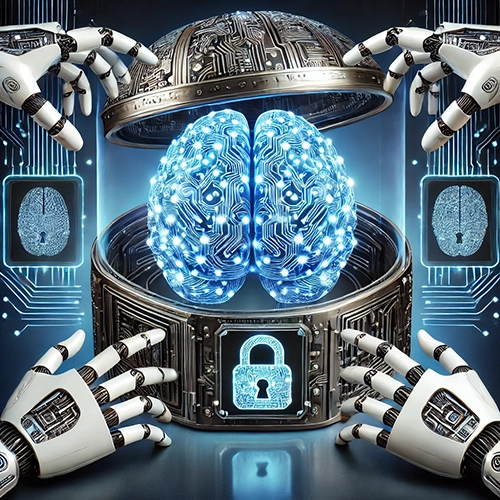
Image by Ralph Losey using his Visual Muse GPT.
I like Dario’s summary of this section; I suppose because I totally agree with it:
In summary, AI-accelerated neuroscience is likely to vastly improve treatments for, or even cure, most mental illness as well as greatly expand “cognitive and mental freedom” and human cognitive and emotional abilities. It will be every bit as radical as the improvements in physical health described in the previous section. Perhaps the world will not be visibly different on the outside, but the world as experienced by humans will be a much better and more humane place, as well as a place that offers greater opportunities for self-actualization. I also suspect that improved mental health will ameliorate many other societal problems, including ones that seem political or economic.
Dario Amodei, Machines of Loving Grace (October 2024).

3. Economic Development and Poverty
This section addresses a crucial humanitarian question: will everyone have access to these technologies? It’s a point that Amodei, true to form, raises right at the outset. His goal for Powerful AI is to bridge the enormous economic gap between people and countries alike and make these new technologies available to all.
Dario approaches this goal with wide-eyed skepticism and awareness of the many obstacles involved. He does not predict equality, but does hope for substantial progress, saying: “A good goal might be for the developing world 5-10 years after powerful AI to at least be substantially healthier than the developed world is today, even if it continues to lag behind the developed world.”

Here are Amodei’s guesses (he does not call these predictions) about how things may go in the developing world over the 5-10 years after powerful AI is developed:
- Distribution of health interventions.
- Economic growth.
- Food security.
- Mitigating climate change.
- Inequality within countries.
- The opt-out problem.
He spells out many lofty goals here but does so in a realistic manner. Here is how he closes this important section.
It won’t be a perfect world, and those who are behind won’t fully catch up, at least not in the first few years. But with strong efforts on our part, we may be able to get things moving in the right direction—and fast. If we do, we can make at least a downpayment on the promises of dignity and equality that we owe to every human being on earth.
Dario Amodei, Machines of Loving Grace (October 2024).

4. Peace and Governance
Dario Amodei takes a very thoughtful approach to this all-important goal. Again, he is no naive optimist. He admits upfront a point cynics and the news media love to emphasize:
Unfortunately, I see no strong reason to believe AI will preferentially or structurally advance democracy and peace, in the same way that I think it will structurally advance human health and alleviate poverty. Human conflict is adversarial and AI can in principle help both the “good guys” and the “bad guys”. If anything, some structural factors seem worrying: AI seems likely to enable much better propaganda and surveillance, both major tools in the autocrat’s toolkit.
Dario Amodei, Machines of Loving Grace (October 2024).
Then Dario goes beyond the fear mentality into what has always been the heart of being human, the optimistic, self-help, can-do mentality. This is part of the culture I grew up in and try to pass on: God helps those who help themselves.
It’s therefore up to us as individual actors to tilt things in the right direction: if we want AI to favor democracy and individual rights, we are going to have to fight for that outcome. I feel even more strongly about this than I do about international inequality: the triumph of liberal democracy and political stability is not guaranteed, perhaps not even likely, and will require great sacrifice and commitment on all of our parts, as it often has in the past.
Dario Amodei, Machines of Loving Grace (October 2024).

Amodei then goes on to state how he thinks we should go about doing this. What geo-political strategy should now be used to protect everyone from misuse of AI by foreign powers? The main threat here is the government of China, although Amodei does not mention them by name.
My current guess at the best way to do this is via an “entente strategy”26, in which a coalition of democracies seeks to gain a clear advantage (even just a temporary one) on powerful AI by securing its supply chain, scaling quickly, and blocking or delaying adversaries’ access to key resources like chips and semiconductor equipment. This coalition would on one hand use AI to achieve robust military superiority (the stick) while at the same time offering to distribute the benefits of powerful AI (the carrot) to a wider and wider group of countries in exchange for supporting the coalition’s strategy to promote democracy (this would be a bit analogous to “Atoms for Peace”). The coalition would aim to gain the support of more and more of the world, isolating our worst adversaries and eventually putting them in a position where they are better off taking the same bargain as the rest of the world: give up competing with democracies in order to receive all the benefits and not fight a superior foe.
If we can do all this, we will have a world in which democracies lead on the world stage and have the economic and military strength to avoid being undermined, conquered, or sabotaged by autocracies, and may be able to parlay their AI superiority into a durable advantage. . . .
Even if all that goes well, it leaves the question of the fight between democracy and autocracy within each country. It is obviously hard to predict what will happen here, but I do have some optimism that given a global environment in which democracies control the most powerful AI, then AI may actually structurally favor democracy everywhere.
Dario Amodei, Machines of Loving Grace (October 2024).
Putting aside the question of the internal struggles many countries are now having about their continued adherence to democratic values, the U.S. included, the foreign policy of AI entente is currently followed by the U.S. government and most other democratic countries. This strategy is implemented by trade restrictions with China. I have mentioned this on my blog several times and agree with Amodei. See e.g. White House Obtains Commitments to Regulation of Generative AI from OpenAI, Amazon, Anthropic, Google, Inflection, Meta and Microsoft (8/1/23); Can AI Really Save the Future? A Lawyer’s Take on Sam Altman’s Optimistic Vision; Also see: What you need to know about Nvidia and the AI chip arms race (Marketplace, 5/8/24).
A vocal minority disagrees with Amodei on this strategy. They consider it overly aggressive. A well-known MIT professor, Max Tegmark, has already written an article that argues the proposed policy in Machines of Loving Grace will trigger a “suicide” AI arms race between China and the U.S.
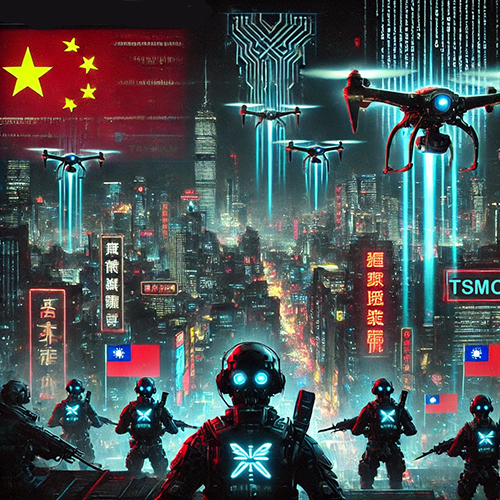
Wake up Max Tegmark! That race started long ago and your hope that China will be good and follow safety standards is dangerously naive.
Returning to Amodei’s discussion of the internal conflict between democracy and autocracy within countries, he offers a hopeful perspective—one that aligns with the sentiments I often express in my AI lectures:
It is obviously hard to predict what will happen here, but I do have some optimism that given a global environment in which democracies control the most powerful AI, then AI may actually structurally favor democracy everywhere. In particular, in this environment democratic governments can use their superior AI to win the information war: they can counter influence and propaganda operations by autocracies and may even be able to create a globally free information environment by providing channels of information and AI services in a way that autocracies lack the technical ability to block or monitor. It probably isn’t necessary to deliver propaganda, only to counter malicious attacks and unblock the free flow of information. Although not immediate, a level playing field like this stands a good chance of gradually tilting global governance towards democracy, for several reasons. . . .
I expect improvements in mental health, well-being, and education to increase democracy, as all three are negatively correlated with support for authoritarian leaders. In general people want more self-expression when their other needs are met, and democracy is among other things a form of self-expression. Conversely, authoritarianism thrives on fear and resentment.
Dario Amodei, Machines of Loving Grace (October 2024).
We can only hope that America remains at the forefront of this fight, maintaining its leadership in pro-democracy policies.
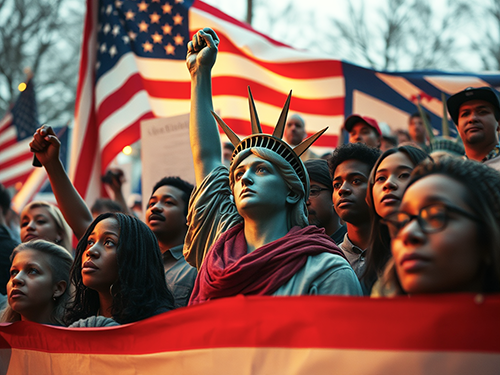
Dario Amodei also makes a few comments on our legal system in this section. As usual he starts with the popular dark side, AI bias, but correctly moves on to what legal techs are already beginning to realize.
[T]he vitality of democracy depends on harnessing new technologies to improve democratic institutions, not just responding to risks. A truly mature and successful implementation of AI has the potential to reduce bias and be fairer for everyone. . . .
For centuries, legal systems have faced the dilemma that the law aims to be impartial, but is inherently subjective and thus must be interpreted by biased humans. . . . Instead legal systems rely on notoriously imprecise criteria like “cruel and unusual punishment” or “utterly without redeeming social importance”, which humans then interpret—and often do so in a manner that displays bias, favoritism, or arbitrariness. . . . AI . . . is the first technology capable of making broad, fuzzy judgments in a repeatable and mechanical way.
I am not suggesting that we literally replace judges with AI systems, but the combination of impartiality with the ability to understand and process messy, real-world situations feels like it should have some serious positive applications to law and justice. At the very least, such systems could work alongside humans as an aid to decision-making.
Dario Amodei, Machines of Loving Grace (October 2024).
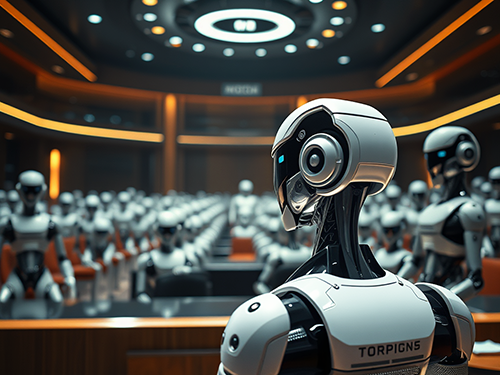
This is exactly the kind of thing that many people like me are working towards. It is indeed already viable as experiments with AI and legal decision making have shown. Improvements in AI intelligence and abilities are still needed but the ultimate Strong AI–a courthouse with a million legal geniuses–is not required to assist in most legal tasks, including judicial. See e.g. Circuits in Session: Addendum and Elaboration of the Appellate Court Judge Experiment (10/26/23); Eleventh Circuit Judge Admits to Using ChatGPT to Help Decide a Case and Urges Other Judges and Lawyers to Follow Suit (6/3/24); Future Ralph as Herald of Coming Good about generative AI and the justice system (YouTube, 11/2/23); Prosecutors and AI: Navigating Justice in the Age of Algorithms (August 30, 2024); ChatGPT’s Surprising Ability to Split into Multiple Virtual Entities to Debate and Solve Legal Issues (June 30, 2024).
5. Work and Meaning
Amodei believes that finding meaningful work in the age of AI presents the greatest challenge. I respectfully disagree. In my view, curing cancer, eliminating other diseases, and extending human life to 150 years will be far more difficult than addressing the question of meaningful work. While Amodei acknowledges that making accurate predictions about changes in the job market is nearly impossible, he still ventures into this area—likely driven by widespread media fear-mongering over job losses, which often ignores historical trends. He begins by aligning with my perspective: that more jobs will likely be created than lost, with the real challenge lying in training and education.
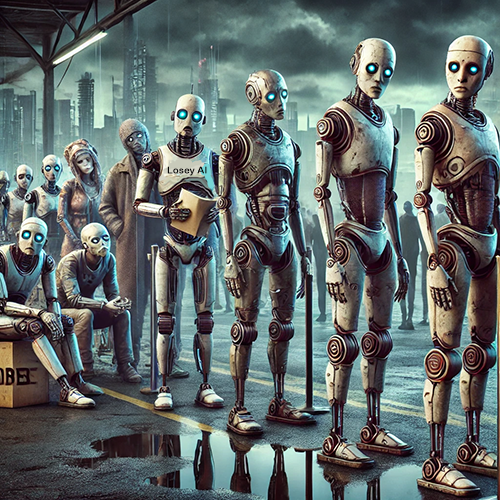
Image by Ralph Losey using his Visual Muse GPT.
Beyond this, he asserts that it is impossible to predict what new forms of economic systems may emerge. However, he emphasizes that “civilization has successfully navigated major economic shifts in the past: from hunter-gathering to farming, farming to feudalism, and feudalism to industrialism.”
The deeper question he raises is based on sci-fi projections far into the future, when no one will need to work because AI can do everything for us. (Think Player of Games or Star Trek.) How can humans find meaning then? Amodei suggests that human meaning has never been solely derived from economic labor, that we can find purpose in relationships, creativity, internal self-discovery, external exploration, and contributing to something larger than ourselves. He believes we can be happy in a world where we are free to pursue our passions and explore our full potential.

Conclusion
In the concluding section of Dario Amodei’s 28-page essay, Machines of Loving Grace, he explains:
I’ve tried to lay out a vision of a world that is both plausible if everything goes right with AI, and much better than the world today. I don’t know if this world is realistic, and even if it is, it will not be achieved without a huge amount of effort and struggle by many brave and dedicated people. Everyone (including AI companies!) will need to do their part both to prevent risks and to fully realize the benefits.
Dario Amodei, Machines of Loving Grace (October 2024).
He then lays a deep thought on us and invites us to ponder the profound impacts these predictions could have on everyone:
But it is a world worth fighting for. If all of this really does happen over 5 to 10 years—the defeat of most diseases, the growth in biological and cognitive freedom, the lifting of billions of people out of poverty to share in the new technologies, a renaissance of liberal democracy and human rights—I suspect everyone watching it will be surprised by the effect it has on them. I don’t mean the experience of personally benefiting from all the new technologies, although that will certainly be amazing. I mean the experience of watching a long-held set of ideals materialize in front of us all at once. I think many will be literally moved to tears by it. . . . a thing of transcendent beauty. We have the opportunity to play some small role in making it real.
Dario Amodei, Machines of Loving Grace (October 2024).

Image by Ralph Losey using WordPress’s Stable Diffusion.
The title of Dario Amodei’s essay, Machines of Loving Grace, was taken from a landmark poem called All Watched Over By Machines Of Loving Grace. It was written in 1967 by Richard Brautigan (1935-1982) while he was a poet-in-residence at the California Institute of Technology. Brautigan is best known for his novel Trout Fishing in America (1967) and is a key figure in the counterculture movement of the 1960s. So, relax, take a deep breath, and let’s end with his poem.
All Watched Over By Machines Of Loving Grace by Richard Brautigan.
I like to think (and
the sooner the better!)
of a cybernetic meadow
where mammals and computers
live together in mutually
programming harmony
like pure water
touching clear sky.
I like to think
(right now, please!)
of a cybernetic forest
filled with pines and electronics
where deer stroll peacefully
past computers
as if they were flowers
with spinning blossoms.
I like to think
(it has to be!)
of a cybernetic ecology
where we are free of our labors
and joined back to nature,
returned to our mammal
brothers and sisters,
and all watched over
by machines of loving grace.

Want to dive deeper into the themes of this article?
Listen to Ralph Losey’s podcast, Echoes of AI: Episode 6 | Dario Amodei’s Essay on AI, “Machines of Loving Grace,” Is Like a Breath of Fresh Air, where his AI podcasters discuss Amodei’s vision for AI-driven progress in medicine, mental health, and more.
Ralph Losey Copyright 2024 – All Rights Reserved
Assisted by GAI and LLM Technologies per EDRM GAI and LLM Policy.


